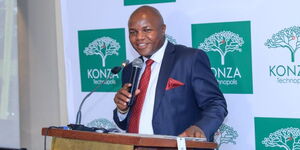In Kenya, hundreds of people move from one place to another seeking jobs especially fresh graduates.
Getting a response from an employer after sending out that application is usually the highlight of the job search.
This means that your potential employers have formed a certain impression of you from your resume.
In their minds, they think you are close to what they consider their preferred candidate, and you have the task of surpassing these expectations.
How you present yourself and answer the questions will determine if you will get the job or get dismissed right away.
The number of questions that can be asked by Human Resources, the hiring manager, and other interviewers is limitless
Poor, or no, preparation is a deadly mistake as it demonstrates to the employer a lack of interest.
Therefore, Preparation is the key to interview success.
Questions, even though common can be approached in the form of a powerful pitch that sets you apart from all other applicants.
The secret to answering common interview questions is understanding what the interviewer is really after and giving well thought and personalized answers.
The following are some of the top common questions asked during interviews and how best to respond to them.
1. Tell us about yourself
Translation: Do you fit the profile of our ideal candidate?
Other versions of the question:
a.) What information about you should we know?
b.) What do we need to know about you?
Important Points to Remember
a.) This is one of the most frequent interview common questions asked during interviews.
b.) Your interviewer basically want to get a feel of your academic credentials, work experience, skills and career achievements.
c.) They have obviously gone through your CV, but need hear it from you. This is a chance to give a pitch and convince them that you would be the best candidate for this position.
d.) Arrange your thoughts in three parts where you introduce you experience and skills, state achievements and successes and end with a projection of your next step in your career.
e.) Cohesive flow of thoughts is critical because mixing up events shows disorganization or possible dishonesty.
Pitfalls to avoid when answering this question:
a.) Steer away from giving too much information. Stick to facts and relevant information. Remember that it is an interview and not a social chat.
Sample Answer:
"I am a customer service team leader heading a team of 8 officers for 3 years now in the Insurance industry. I have a degree in Business management, a certificate in Customer Service and I have undergone several Customer Service and Customer Relationship Management workshops.
"My team mainly handles insurance claims from customers and coordinates with relevant insurance companies for settlements. I was awarded Best Customer Service Officer at the end of my first year in the job, and I have been recognized in my company as the Team Leader of the Year two years in a row.
"At this point, I envision the next step in my career in a different industry as yours to experience your kind of clients and improve my exposure to handling customers".
2. How did you hear about this position?
Translation:
Did you specifically search for our company or did you stumble on the advert? Are our advertising methods working? Are we searching in the right pool?
Other Versions of the question:
Where did you get information on this job?
Important to Note:
a.) This may seem like an overly unnecessary question, it is a very common question and there is a strategic reason behind it by the interviewer.
b.) The interviewer may want to know whether you were seeking the job actively or passively and whether you actually targeted their company.
c.) They also want to know which of their job advertising method works best.
d.) They might even have a rewarding scheme in their work place that rewards existing staff who recommend excellent candidates to fill certain positions.
e.) Be specific and brief in your answer about the source, but do not dwell on unnecessary details unless asked to elaborate.
f.) Use this as a marketing opportunity and talk about the particular details of this job that drew you to the advert.
g.) At the same time, in a succinct way, define why you feel qualified for the position advertised and why you would be excited to join the team.
Pitfalls to Avoid when answering this question
a.) Dropping names may backfire in your face, especially if the person you mention is currently in a strained relationship with the company
b.) Always confirm with a current employee whether or not to mention their name.
c.) If you somehow cannot remember the name of the site you got the advert from, do not make up a name. Just state that you currently cannot remember.
d.) If you are aware of a strained relationship between the person who referred you and the company, do not refer to them.
Sample Response:
"I heard about this accounting position through a current member of staff here, Mr. John. We used to work in the same department at company XYZ where I was an intern then.
"After looking through your ideal candidate profile and doing a bit of research on your company, I am convinced that I am cut out for this role and I feel excited at the possibility of joining your team".
3. What do you know about this company?
Proper research about a company can reveal information that is not common knowledge to many job seekers. You could stumble upon recent milestones that the company you wish to join recently attained.
This will work well to your advantage and the panel of interviewers will be impressed by your keen interest in their company.
At the end of the day, informed answers to a panel will always win over empty bravado in an attempt to impress. Interviewers can see through futile cover-ups efforts trying that replace the lack of planning and research. Be wise.
Answer:
You can state for instance:
“Well, from your users’ reviews I saw happy clients showing their appreciation for your quick response, excellent customer service and innovative products. I would definitely like to be part of a team that is this passionate about customer satisfaction and they live to grow it.”
Negative reviews or complaints should point to you the company’s pain. This should help you position yourself as the guy with the solution.
For instance, when asked what value you will be bringing, or why they should hire you, sit up straight because you will blow them away with an informed response.
“I have a rich background in user experience and support. Despite the many positive reviews from your users, I noted a few disgruntled reviews mainly on down time and failing systems. These are issues I have dealt with in the past and I hope to implement with your users and improve customer satisfaction levels.”
Such a response not only shows your deep understanding of the role you are looking to fill, but your analytic skills and the ability to see the bigger picture. You will be miles ahead of other candidates.
4. Why do you want this job?
Translation:
Why did you apply for this position?
Related Questions:
Why do you want to work here?
Why are you interested in this position?
Important to Note:
a.) The interviewer only wants to ascertain that you actually want to join their team for a valid reason.
b.) To answer this question in a way that will create impact, look at it as an opportunity to showcase how your skills match perfectly with the organization’s culture, vision and values.
c.) You can also portray how you joining the team fits in with your ultimate career goal and how enthusiastic you are at the opportunity.
Pitfalls to avoid when answering this question
a.) You failing to mention the company when answering this question is an immediate red flag to the interviewer. Yes clearly you have skills and your experience is acceptable, but if you cannot say how your skills will benefit your interviewer’s company they lose interest.
b.) Giving away too much information is unnecessary. You don’t need to state how the company is close to your home, or how you will have an easy time dropping your children to school due to flexible working hours. All this is irrelevant.
c.) You talking about your current or previous employer negatively. Even if you hate working at your current company, your interviewer doesn’t need to know.
Sample Response:
"I have always wanted to be part of a team that makes tangible difference in people’s lives like your organization does. When I saw the advert, I was drawn to the qualities your ideal candidate should have and I realized I possess them all and it would be my career dream to put them to work".
5. Why should we hire you?
Translation:
We have hundreds of applications for this position. Why should it be you that we choose?
Other versions of the question:
a.) What is it about you that makes you stand out?
b.) Why do you think you are the best candidate for this job?
c.) What are you bringing in this role?
Important to Note:
a.) Always remember that the interview is not about you, but the company getting the best talent the market has to offer. The best approach is aligning existing skills and experience to the company’s needs and current pain.
b.) The interviewer wants you to convince them that you are worth the recruiting trouble. They want to be sure that you can perform and that out of all the applications they have received, their best shot is seated right in front of them.
c.) The interviewer needs to know that you will be an excellent addition to their already existing team.
d.) They are, most of all, out to scout and recruit the best talent because it will make them look good at what they do and also make their work in the office easier.
e.) Do not be too modest about your previous or current achievements. Throwing in a success story in your pitch will earn extra points for you.
Pitfalls to avoid when answering this question:
a.) Coming off as over confident and even corky. This usually rubs your interviewers the wrong way. Answers like “ Because I am awesome. I will give 101% of myself to this role and turn sales around. I am definitely the best candidate you have met so far and I don’t think you will meet anyone better.”
b.) Overselling yourself to look like their most desirable candidate. This includes lying about your qualifications, skills and experience. The truth will eventually be known and the consequences may be dire for you.
c.) The most common mistake that candidates make in the face of such a question is panic and fail to recognize the rare opportunity to market their skills. They then result to whinny answers that sound desperate and self-deprecating.
These answers are like; “ Well, uh, I have a degree, I am intelligent and I have integrity. I am eager to do anything assigned to me and I would really like to join your team.”
Sample Response:
"What caught my eye most on the job advert was the fact that you were looking for Content Manager with impeccable writing skills and communication skills. My CV states that I have 3 years concurrently writing for 2 different companies on part time basis.
"However, I believe what really makes me stand out is my passion for content, my excellent communication skills and my keen interest in social, business and political trends.
"I recently helped my company win a Customer Service Write up award for the first time since they started participating. I value interactions with my internal and external customers and my work ethic is based on discipline, commitment and going the extra mile in tasks assigned. These values have guaranteed success and positive results so far".
6. What are your greatest professional strengths?
Translation:Is the candidate self-aware
Related questions:What do you think sets you apart from other applicants?
a.) Why should we hire you?
b.) Why you?
c.) What can you say makes you the perfect fit for this position?
d.) What arel your professional strengths?
Important to note:
a.) Self-awareness is very critical in candidates during interviews. When interviewers ask about your strengths, they want to ascertain that the candidate is self-aware and more importantly can relate their skill set with the role.
b.) Your interviewer wants to identify qualities, skills and experience that is only unique to you or that which you master really well. It is hence, your best time to shine.
c.) Your interviewer is also keen on your communication skills. Your thought process when answering this question is key.
Ensure your thoughts flow coherently. The secret to this is planning ahead. Ensure that you have a short list of your most relevant strengths on your fingertips.
Pitfalls to avoid when answering this question:
a.) Avoid making a long list of strengths. You should have at most five strengths that you can elaborately define and give examples of instances where you applied these strengths.
b.) Do not give irrelevant strengths. For instance, saying you can walk on your hands for 400 meters while interviewing for an accountant position. Every strength you list should be tied to the current position.
c.) Ambiguous answers should be avoided at all cost. Know your specific strength and have specific examples to accompany these strengths.
d.) Avoid the temptation to give canned answers. These backfire in your face when asked to elaborate and you realize mid-sentence that what you are trying to explain has nothing to do with you or the position in discussion.
Sample Response:
"I possess outstanding customer service and interpersonal skills. Apart from the routine courteous conversation with clients and follow up, I used to go an extra mile to find solutions for unprecedented client problems.
"Once, one of our driver called and reported a stalling case that was likely to result in him delivering some merchandise to a client 2 hours late.
"I called the client and informed them of our predicament. They were understanding and even asked where our truck was so that they could pass by and collect the package. This way, we averted unnecessarily inconveniencing an esteemed customer".
7. What is your weakness?
Translation:
Is this candidate self-aware? Can they be problem solvers?
Other versions of the question:
a.) What do you consider your greatest weakness?
b.) Do you have a weakness that we should know about?
c.) If you were given the power to change one trait in your, what would it be?
d.) If your previous employer was asked to name the one thing you need to work on, what do you think they’d say?
Important to note:
a.) Your interview has been on that side of the table for a while. They have asked this cliché question over and over and are probably praying at the moment that you don’t give them one of those canned answers like’ I am a perfectionist’.
b.) Your interviewer also wants to find out if you are self – aware, so don’t make the mistake of saying you don’t have any weaknesses. It shows an utter lack of self- awareness.
c.) Your interviewer knows you are wearing an interview mask that will eventually fall off once you are employed. They would like to get a peak of what the real picture looks like.
d.) A good weakness should be fixable and you should be able to follow up with a statement saying how you are working on it. It should be authentic and acceptable for the position you are applying for.
e.) You should define your weakness in a concise but impartial way. Going too much into detail may make you sound defensive.
Pitfalls to avoid when answering this question:
a.) Having one weakness in mind such that when the interviewer asks for another weakness the candidate looks at them like a deer caught in the headlights.
b.) Giving weaknesses that are completely unrelated to the position and fumbling for words when asked how these weaknesses hinder performance. This portrays you as a fibber.
c.) Giving weaknesses that deflect responsibility to you and make it sound like you are blaming others. E.g “I don’t like it when people don’t communicate. “ That is not a weakness but a result of a circumstance.
Response:
Sample 1.
"As a manager, I have realized that I tend to micro-manage and rarely delegate due to fear of my team members messing up a project. I have realized that this eats up most of the time that should be spent making strategies. I also realized that I am denying my team growth opportunities by learning from their mistakes.
"I have begun making conscious decisions to delegate and even though work output is taking longer, I feel that teamwork is more enhanced now in my department and I have cleared my work load for more strategic planning.
" I also started taking managerial workshops that help me discover how else I can improve my team’s performance".
Sample 2.
"I feel that I still have some ground to cover in public speaking. When called upon to present in front of large groups I get flustered and extremely nervous. I have been conducting research on ways to improve and I have gained a few tips that I am implementing.
"I also suggested to my manager that he allows me once in a while to introduce him in conferences. With time, I believe I will be able to confidently speak in public with no problem at all".
8. What is your greatest career achievement?
Translation:
Do you work on deliverables? Can you identify when you attain your deliverable?
Other versions of the question:
a.) Which accomplishment are you most proud of?
b.) If you were to retire today, which project will you look back at in your retirement party and feel absolutely accomplished?
Important to note:
a.) This is the most important behavioral interview question your interviewer will ask. The answer you give not only provides an insight of your values, but a peak at your commitment, tenacity, persistence and ability to prioritize.
b.) Your answer should be related to your career. If you are a beginner, talk about something you did that stemmed out of passion; like volunteering, or how you exceeded your supervisor’s expectations during internship.
c.) You can also talk about a particular roadblock at work that you overcame. Success in handling customers or suppliers can also be termed as achievements.
d.) Your answer should highlight the processes that led to you attaining the achievement in question.
e.) Ensure that you have your three most cherished achievements and their details on your fingertips just in case the interviewer is interested in knowing more.
f.) Make sure your achievements are tangible and measureable. E.g in sales give actual numbers, in customer service state awards given and if certificates are available, present them.
However, be careful not to give away confidential information that might not only present legal consequences to you, but also make the interviewer wary that you have confidentiality issues.
Pitfalls to avoid when answering this question:
a.) Being unprepared for this question is a guaranteed failure. If this question finds you by surprise you will stumble through the answers and will most likely forget items that might actually make you stand out.
b.) Have more than one achievement, in case the interviewer is more interested in your projects.
c.) Avoid giving achievements that are not related to your career or the position you are applying for.
d.) Do not give negative achievements. For instance, stating how funding for projects in your previous employment were always pulled out at the last minute which resulted in massive layoffs and you achieved by avoiding the layoffs.
e.) An achievement is usually something outside your normal job description. Do not state how you performing what is expected of you as an accomplishment. E.g do not say ‘I was never late for the whole of last year.’ Or ‘I handed in all my accounting reports in time.’
Your interviewer wants to hear how you helped take the department you were in to another level, not how you helped maintain the status quo.
Sample response:
“I have had several outstanding achievements throughout. My most recent and what I consider the most outstanding is when I led my department in winning the Customer Service Award in the region.
"I lead a customer service team of 15 members. Our services are carried out via phone, email and various social media platforms.
" We launched a social media campaign early last year and by the time competition for the award was set in motion at the end of the year, we already were a force to reckon with.
"We already had overwhelmingly positive reviews and there is a marked improvement in sales as a result of customer referral.
"Credit for the award goes to my team for unique and creative problem solving solutions, immediate response to queries 24 hours a day, timely and effective follow up and pure raw passion for customer satisfaction.
"I am proud to have led such an incredible team and I hope to bring with me the same passion and enthusiasm for customer service".
9. Where do you see yourself in the next 3/5/7/10 years?
Translation:
Do you actually have a plan for your career or are you just gliding through life
Other versions of the question:
a.) What is your growth plan?
b.) What direction do you envision your career to take?
c.) What do you seek to achieve in the course of your career?
Important to note:
a.) The interviewer is checking to ascertain that you have a career trajectory planned out for yourself. They want to know that you are ambitious and that you seek growth, because growth for you means maximum utilization of your talents which will culminate in growth for their company.
b.) The interviewer wants to know how the position you are interviewing fits in your grand career plan. This means that if you hold the position you are interviewing for in high regard, it translates to you performing well in the roles assigned. It is a show of commitment.
c.) If the position falls in your great career plan, you are likely to be enthusiastic about it and excited by the growth opportunities it presents, hence you will be constantly motivated and are likely to face challenges positively.
d.) Therefore, the paths you have set out should be realistic and actionable in relation to the industry your career falls in.
e.) Your goals should also be realistic depending on the stage at which you are in your career. Where beginners straight from college may be forgiven for giving somewhat unrealistic projections, individuals who have been in the industry for some time will not be dealt with equal leniency.
f.) You goal should be targeted. Do not use tired lines like “I see myself in a management position”Your answer should be truthful, reasonable and fluid with departmental limits. This means that you should give a perception of flexibility and ability to take up more roles apart from those listed in the advert.
Remember that your interviewer has their ideal candidate in mind and are looking for the closest match to that. You shouldn’t come across as rigid or being a round peg in a square hole. You will lose out in opportunities for growth and exposure.
Pitfalls to avoid when answering this question:
a.) Jumping to long term goals without stating the short term ones, such that you are viewed as building castles in the air. There is nothing wrong with you planning to be the managing director of the company.
Unless you are already in a senior management position, mentioning that you would like to be MD may seem a bit far-fetched. Specifically state short term goals that will help build the long term ones.
b.) Giving goals unrelated to your career like telling the interviewer how many children you look to have in five years. Remember that interviews are always about the company and all your answers should be geared to how you are going to be value add to the company’s goals, vision and mission.
c.) Giving rigid plans and goals. When an interviewer gets the impression that you have a specific path that you have your mind set on, they think you cannot be persuaded to take on additional tasks and become wary.
E.g saying “ I would like to be a CEO, with at least 5 people reporting to me, earning 200k per month, paid vacations, and a company car.
d.) Overthinking this question will make you nervous and you will end up with a blank head. Ensure that you have practiced answering this question ahead of the interview.
Sample response:
"I am keen on becoming the best I can be in what I do. I am seeking opportunities that expose me to further development of my skills, become involved in interesting projects and be part of a team that I can learn immensely from.
"Based on my research, your company is a force to reckon with in the industry and some of the biggest contributors to innovation in the industry work here. For me, that is my greatest motivation to build my career".
10. What does your former boss say about you?
Translation
What was your relationship with your former boss like?
Other versions of the question
a.) If I contacted your former or current boss, what is the one thing they would say about you?
b.) Can I contact your former boss?
c.) Would your former boss recommend you for this position?
Important to note
a.) This is your chance to highlight all the praises your former boss gave you
b.) Do not say that your former boss should not be contacted because it shows that you had a bad relationship
c.) Focus on selling your key strengths
d.) Do not say that your relationship with your former boss was bad or ended badly
Pitfalls to avoid when answering this question
a.) Do not badmouth your former boss
b.) Painting a picture of a very strained relationship
Sample answer:
"My former boss and I had a very fruitful working relationship. We worked closely on several projects with them mentoring me closely. I learnt many things from them and went ahead to execute several projects highly and I am sure my skills be missed.
"As such, my boss highly recommends me for the position and would particularly highlight the fact that I am hardworking, dedicated, a fast learner and most of all, I always ensure that I complete my work on time".
11. Why do you want to leave your current job?
Translation: Have left your previous job in good terms? What kind of relationship did you have with your previous employer and colleagues. What is your personality, credibility and can you relate well to people?
Other versions of the question
a.) Why do you want to leave your current job?
b.) Would your former colleagues recommend you for this job?
c.) What skills do you bring on board from your current/previous job?
Important to note
a.) Be honest and tactical when giving your answer
b.) Focus on your positive contribution to your former boss
c.) Some situations are beyond your control
Pitfalls to avoid when answering this question
a.) Do not say that your current workplace is toxic/unfavourable
Answer:
Sample 1:
"I have worked at company X for three years and was awarded the best employee of the year for my exemplary performance in teamwork and problem solving.
"Having successfully achieved that, I am ready for another challenge with your company and to offer my expertise in X field for the overall benefit of your organisation".
Sample 2:
"I have been working hard for the past five years in a similar position, improving on key skills that are critical to this new position and creating a consistent positive impact on the organisation.
"With this in mind, that is the reason I am really keen to find a senior position with your company.
"Your company also offers an ideal environment and practical exposure that will allow me to be fully committed to this position and based on my track record, I am confident that i will meet the company’s objectives".
Source: BrighterMonday Kenya












